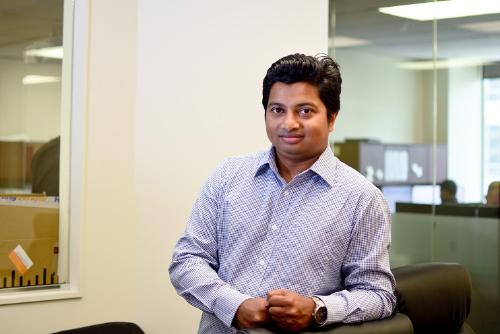Kshama Roy

Memorial University Alumnus
Geotechnical and Pipeline Stress Specialist, Northern Crescent Inc.
Where are you from originally, and for how long have you lived in Canada?
I am originally from Bangladesh and I have been living in Canada for 8 years. I came to St. John’s and Memorial University in September 2010 for my Master's degree. Right after I completed my Master's in 2012, I got several job offers. However, I decided to start my Ph.D., which I completed in November 2017. I joined Northern Crescent in December 2017.
Where are you working now? Did you start working right away after completing your degree at Memorial University?
I am currently working as a “Geotechnical and Pipeline Stress Specialist” at Northern Crescent Inc., a company located in downtown Calgary. Yes, I started my job right away after completing my Ph.D. I received the job offer two weeks before my Ph.D. defence.
How was the transition from being an international student at Memorial University to a full-time employee?
As for the workplace, the transition was simply fabulous. My colleagues at my company (especially my manager and the President of the company) made it super easy for me to settle in. They were extremely welcoming: they welcomed me like a family member.
However, the transition from being a student to being an employee was a little more difficult for me when it comes to a work culture point of view. For example, I was mainly involved in research at MUN, which is different from the actual project work conducted in the industry (especially regarding the timelines and the terminology used in the industry). Therefore, it took me a couple of months to blend in with this type of work culture. I believe that my leadership skills, which I gained through my involvement in various extra-curricular and volunteering activities at Memorial, helped make my transition easier.
How have your international background and culture been beneficial to your employer?
At Memorial, I was involved in various leadership activities (e.g. I worked as the President of the Teaching Assistants’ Union (TAUMUN), I was involved in the Engineering Graduate Students’ Society (EGSS), the Graduate Students Union's Board of Directors, and I was a Memorial Ambassador). While serving in these positions, I dealt with a lot of international students and communities. Every time I met or worked with people from a different background or culture, I found that their perspectives when it comes to completing a task are completely different from one another! I was surprised to see how a diverse team is much more efficient than one consisting only of people from a similar background.
I think that my involvement in such activities, and especially my dealing with people from different cultures and backgrounds, have broadened my point of view and helped me approach problems in many different ways. Whenever I deal with a complicated project at my workplace, as a first step, I think of the different ways in which the problem can be approached, and of possible different solutions.
Did you work during your studies at Memorial University? How has that helped you prepare for entering the workplace after graduation?
Yes, I worked as a teaching assistant, research assistant, and TA trainer in addition to serving in several student societies. I believe that the wide variety of responsibilities I held in those positions helped me develop a rich skill-set that is beneficial to my workplace.
The three major skills I developed from working during my studies are:
(i) Time management skills;
(ii) The ability to work under pressure;
(iii) Communication skills.
For example, there were often situations where I had the meet a deadline to submit a paper, but I had to mark students' assignments at the same time. The ability to multitask helped me develop my skill of working under pressure or with tight deadlines - which is definitely useful for someone in my current position.
From your experience, why should employers consider hiring international students and graduates?
I believe employers should consider developing a team of diverse people at their workplace. This diversity may come from various sources: a diverse educational background, culture, work experience, age, country of origin, etc.
From my own experience, I found that international students have a very rich skill-set because of the nature of their lifestyle and international student experience. For example, many international students have likely travelled a long distance from their country of origin to reach Canada, and they have most probably gone through a culture shock. However, they have successfully managed to overcome the cultural shock and adapt to the local culture. Through this "blending-in" process, they have developed or improved several skills. Therefore, in addition to their excellent technical skills, they have also developed additional skills throughout their graduate program that are important for the industry (e.g. adaptation skills, flexibility, cultural awareness, emotional intelligence, and above all, a broader perspective).
Any questions? Contact our International Student Career Advisor.